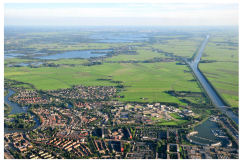 The Case Study aims at assessing innovative technologies and concepts for enhancing the overall eco-efficiency in the use of water for energy supply by thermal power plants. The area of implementation concerns the water system of the Amsterdam-Rhine Channel, the Netherlands.
The Case Study aims at assessing innovative technologies and concepts for enhancing the overall eco-efficiency in the use of water for energy supply by thermal power plants. The area of implementation concerns the water system of the Amsterdam-Rhine Channel, the Netherlands.
Due to the wide variety of functions and uses of the Amsterdam-Rhine Channel (ARC), ecological issues may arise during the summer, as a result of the increased water temperature and reduced flow. The need to maintain water temperature standards can result in a decrease of energy production or even plant shut-down, with significant economic consequences, including electricity shortage and direct impacts for local consumers. The economically efficient enhancement of the overall sustainability of the water-energy system, through innovative technologies for water temperature control, thermal energy recovery and use, and closed-loop processes, is a highly relevant goal and priority of authorities and local actors
In this regard, the Case Study will assess wider environmental impacts/ improvements and the added economic value that would arise from the implementation of innovative technologies, focusing particularly on: (a) the abstraction of cooling water, (b) the control of thermal discharges, (c) the recovery and use of the otherwise wasted energy, and (d) the reuse of cooling water in other use sectors.
Assessed environmental impacts will concern water and energy input/output flows, greenhouse gas emissions, but also other relevant categories (reliability in energy delivery, materials’ usage, etc.).
Read more...
Documents and other resources
Deliverable 4.1: Description of value chains for industrial water use [PDF, 2.2MB]